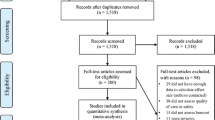Abstract
Edmund Pellegrino claims that medical ethics must be derived from a perception of the patient's “damaged humanity,” rather than from the self-imposed duties of professionals. This essay explores the meaning and examines the challenges to this patient-centered ethic. Social scientific and bioethical interpretations of medicine constitute one kind of challenge. A more pervasive challenge is the ascendancy of managed care, and especially investor-owned, for-profit managed care. A list of questions addressed to patients, physicians and organizations is offered as one means of assessing this threat and moving toward morally trustworthy relationships.
Similar content being viewed by others
REFERENCES
Pellegrino ED. Humanism and the Physician.Knoxville, Tenn.: University of Tennessee Press, 1979: 117–129.
Pellegrino ED, Thomasma DC. A Philosophical Basis of Medical Practice. New York: Oxford University Press, 1981: 207ff.
Humanism and thePhysician: 127.
American Medical Association. Code of Medical Ethics1847. New York: H. Ludwig and Co., 1848.
Veatch RM. A Theoryof Medical Ethics. New York: Basic Books, 1981: 106.
Butler J.In Raphael DD, ed. Fifteen Sermons, 4th ed., in British Moralists 1650–1800. Oxford: Clarendon press, 1969: 335.
See Golenski J, Cloutier M. The ethics of managed care. Medical Group Management Journal, September/October, 1994 and Iglehart JK. Physicians and the growth of managed care. New Engl J Med 1995; 331: 1167–1171.
Managed Health CareOverview 1994–1995. Washington, D.C.: AMCRA Foundation, 1995: 27.
The economic, moral and organizational problems in saying“no” to patients have been fruitfully explored by Lester Thurow. Learning to say “no.” New Engl J Med 1984; 311: 1569–1572, and by Norman Daniels in his, Why saying no to patients in the U.S. is so hard. New Engl J Med 1986; 314: 1381–1383. The issues they discuss have become more acute with the rise in aggressive, entrepreneurial approaches to managed care, which have made both the physician's ability to say “no” and the patient's willingness to hear it more complicated than in the mid 1980s.
TheConsumer Reports three-part series that began with the July 1992 edition is one of the clearest and most cogent analyses of the problems in U.S. health care.
Iargue this point in detail in Rationing Health Care in America: Perceptions and Principles of Justice. Notre Dame, IN: University of Notre Dame Press, 1987: 110–111.
Hall MA. Rationing health care at the bedside. New YorkUniv Law Rev 1994;69:775.
Povar G, Moreno J.Hippocrates and the health maintenance organization. Annals of Internal Medicine September 1, 1988: 423.
Ibid.
Thisconsideration is an important one posed by many physicians. See, for example, the brief essay by Carolyn M. Clancy and Howard Brody. Managed care; Jekyll or Hyde? J Amer Med Assoc 1995; 273: 338–339. Yet the AMA “Guidelines” omit this consideration. See Ethical issues in managed care. J Amer Med Assoc 1995; 273: 330–335.
Author information
Authors and Affiliations
Rights and permissions
About this article
Cite this article
Churchill, L.R. “DAMAGED HUMANITY”: THE CALL FOR A PATIENT-CENTERED MEDICAL ETHIC IN THE MANAGED CARE ERA. Theor Med Bioeth 18, 113–126 (1997). https://doi.org/10.1023/A:1005769723154
Issue Date:
DOI: https://doi.org/10.1023/A:1005769723154




